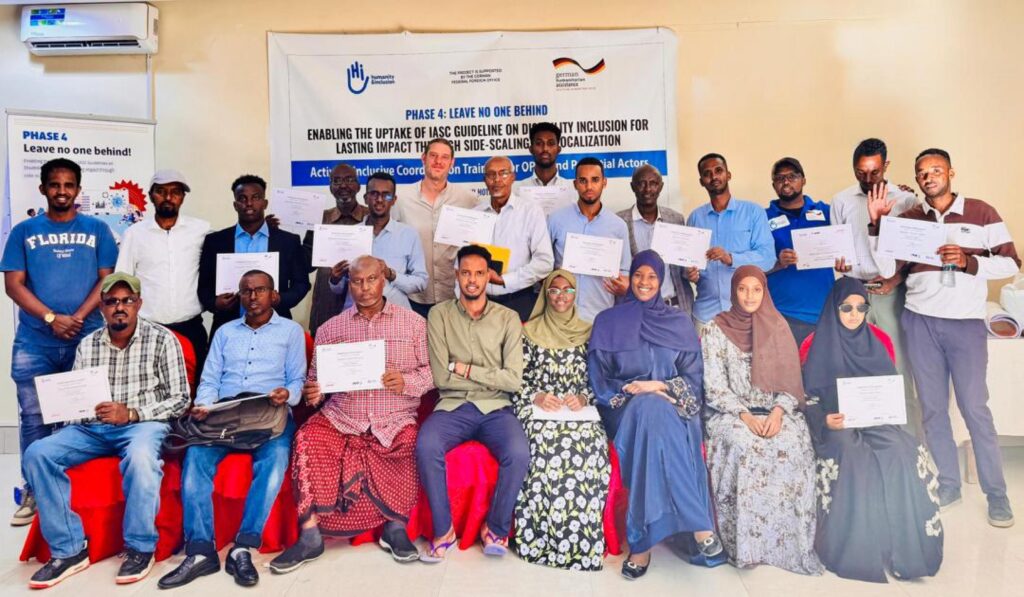Driving Inclusion Forward: OPDs Lead Efforts to Strengthen Disability-Inclusive Coordination in Somalia and Somaliland
Category
General Somalia & Somaliland
© Aden Ismail/HI
From 14 – 15 October in Hargeisa and 22–23 October 2025 in Mogadishu, the Phase 4 – Leave no one behind! project team in Somalia and Somaliland, with technical support from the Global Inclusive Humanitarian Action (IHA) Specialist, conducted a two-day Inclusive Coordination Training. A total of forty-four participants (eight women and thirty-six men) attended the sessions, representing Organizations of Persons with Disabilities (OPDs), government institutions, humanitarian organizations, and cluster coordination leads.
The training aimed to empower OPDs to take active leadership in ensuring that humanitarian responses are inclusive, equitable, and responsive to the diverse needs and priorities of persons with disabilities. Additionally, it sought to strengthen sustainable, disability-inclusive coordination mechanisms within the humanitarian structure.
This training represented an important step in promoting collaboration, mutual learning, and a shared understanding among participating actors. It also strengthened the collective commitment to advancing disability inclusion across all sectors of humanitarian response in Somalia and Somaliland.
The training was designed to enhance participants’ understanding of coordination structures at the country level, enabling OPDs to influence and contribute meaningfully to humanitarian decision-making processes. The sessions covered a wide range of topics, including humanitarian coordination structures, the humanitarian reset and its implications for operations, inclusive coordination, the humanitarian programme cycle, and a brief introduction to the Humanitarian Needs and Response Plan (HNRP). The training was closely linked with an ongoing workshop on the disability-inclusive HNRP, which aimed to prepare OPDs with the knowledge and skills needed to engage effectively in the 2026 HNRP process.
By positioning OPDs as key actors within coordination systems, the training strengthened their understanding of humanitarian structures, guided them to identify entry points for advocacy, and raised awareness among government agencies and cluster leads about their responsibilities in creating inclusive coordination spaces. Ultimately, this initiative represented an important step toward integrating disability inclusion into decision-making processes and ensuring that the voices and priorities of persons with disabilities are at the center of humanitarian responses in Somalia and Somaliland.
This initiative represented the first opportunity for OPDs, government institutions, humanitarian organizations, and cluster leads in Somalia and Somaliland to receive in-depth training on inclusive coordination. It provided an interactive platform for OPDs, government representatives, humanitarian organizations, and cluster leads to discuss existing barriers to inclusion and openly explore practical solutions. OPDs raised key challenges that hinder their participation in coordination mechanisms, while government and cluster leads reflected on institutional and structural constraints that have limited OPD engagement. These discussions helped build a shared understanding of each actor’s role in promoting inclusive coordination and identified concrete actions for moving forward.
Mohamed Abdisalam, Executive Director of SODEN and co-chair of the Disability Inclusion Working Group for OPDs, shared:
“As an OPD, we have long recognized the need to influence humanitarian actions to ensure persons with disabilities have equal access to services. Yet, limited information and unclear engagement pathways have made this challenging. Today’s training has equipped OPDs with a clear understanding of coordination structures, their roles, and how to participate effectively. The presence of government representatives, humanitarian organizations, and cluster leads further enabled direct engagement and strengthened collaboration.”
Abdullahi A. Abdalla, Somaliland WASH Sector Coordinator at the Ministry of Water Resources and Development, stated:
“As a cluster lead, it is our responsibility to ensure response reaches all people affected by the crisis. However, the limited participation of OPDs in these efforts has always been a challenge. This training provided an invaluable opportunity for us to meet and engage with OPDs, listen to their perspectives, and understand the exact challenges they face in accessing and participating in our coordination structures. I truly appreciate the space this training created for mutual understanding and commitment between us and the OPDs. I believe this marks the beginning of a new and more inclusive journey for our coordination structures and future cooperation.”
Text by: Amal Abdilahi, Somalia & Somaliland
